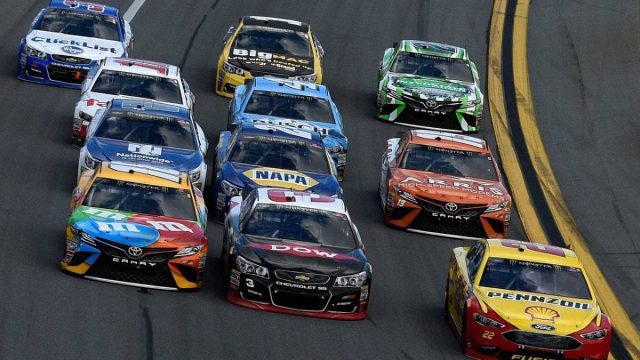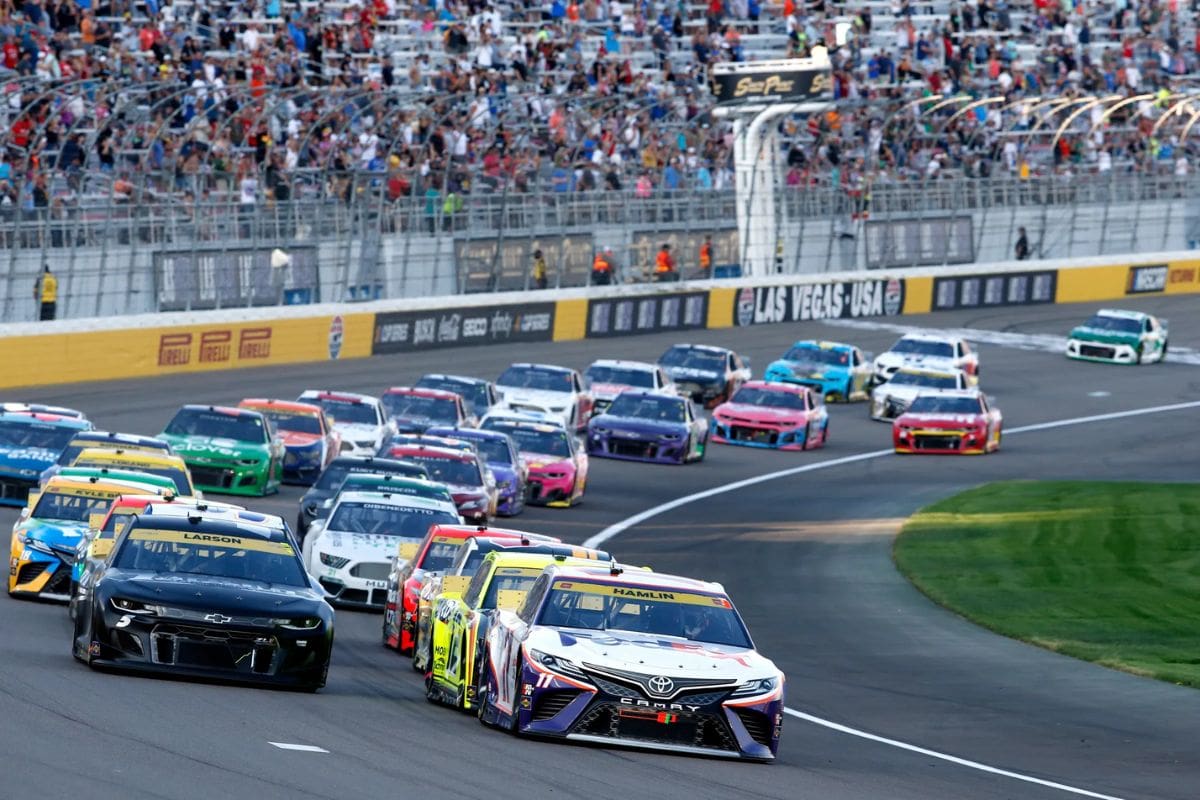NASCAR’s Global Ambitions: As NASCAR sets its sights on international expansion, the impending introduction of a points-paying Cup Series race outside the United States—marking the initial such event since 1958—raises critical questions about the organization’s readiness for this bold venture. With potential locations in Mexico or Canada by 2025, NASCAR aims to broaden its audience and utilize the motorsport fervor in these regions. Yet, this ambitious move must navigate existing domestic challenges, including fan satisfaction and economic disparities. The implications of this strategy could redefine NASCAR’s identity on a global scale, but what hurdles lie ahead?
Key Highlights
- NASCAR plans to host its first points-paying Cup race outside the U.S. in Mexico or Canada by 2025, signaling significant international ambitions.
- The organization aims to tap into Mexico’s motorsport culture to build a dedicated fan base and enhance global engagement.
- Despite domestic challenges, NASCAR’s recent viewership growth indicates potential for successful international expansion if managed effectively.
- A focus on localized racing series and partnerships with local stakeholders is essential for creating authentic and appealing events abroad.
NASCAR’s International Expansion and Future Prospects
NASCAR’s ambition to expand internationally reflects a tactical initiative to engage a broader audience and diversify its competitive landscape, particularly as it plans for a potential race in Mexico in 2025.
With a historical backdrop of 204 different drivers winning races in the NASCAR Cup Series since its inception in 1949, the striking reality remains that only six of these drivers were born outside the United States. This limited international representation highlights a critical gap in NASCAR’s appeal, prompting the governing body to contemplate a strategic venture into the global market.
The projected race in Mexico signifies more than just a calendar supplement; it represents a crucial shift towards inclusivity and an acknowledgment of the sport’s latent international fan base. By tapping into Mexico’s vibrant motorsport culture, NASCAR aims to cultivate a dedicated following, thereby increasing its market share and revenue potential.
Additionally, this expansion aligns with a broader trend observed across different sports, wherein governing bodies seek to internationalize their brand to foster new partnerships and sponsorship opportunities.
As NASCAR initiates this ambitious expedition, the implications for its operational and marketing strategies will be profound. Successful execution will necessitate a delicate balance between preserving the sport’s traditional roots while adapting to the expectations and preferences of diverse audiences.
Global Ambitions and Domestic Challenges
Amid ambitious plans for international expansion, NASCAR faces considerable domestic challenges that could hinder its growth path and fan engagement.
The current dissatisfaction among fans regarding the sanctioning body’s decision-making processes reflects deeper issues within the organization. Criticisms surrounding late-race caution calls and charter negotiations have heightened frustration, suggesting that internal governance may impede NASCAR’s ability to project a unified and forward-thinking image.
Furthermore, delays in reaching agreements between race teams and NASCAR are concerning, particularly given the potential for substantial financial gains from media rights deals with platforms like Amazon Prime and Warner Bros. The inability to finalize these agreements may stall momentum, especially as NASCAR seeks to capitalize on its growing global appeal.
The release of ‘NASCAR: Full Speed,’ which achieved remarkable success on Netflix, demonstrates the sport’s burgeoning interest overseas. However, despite a reported 35% increase in viewership in 2024 compared to the previous year, with an average of 3.86 million viewers per race, the glaring contrast in revenue from international markets remains troubling.
Only US$5.3 million of NASCAR’s US$831.6 million annual media rights revenue is derived from abroad, emphasizing the sport’s heavy reliance on North American audiences.
NASCAR’s International Presence and Strategies
With a tactical focus on developing localized racing series and infrastructure, NASCAR is actively expanding its international presence beyond North America. This strategic approach allows NASCAR to establish a foothold in diverse markets while fostering grassroots engagement with local racing communities. Currently, NASCAR sanctions competitions in Mexico, Canada, Brazil, and Europe, emphasizing its commitment to tailoring experiences that resonate with regional audiences.
One of the key elements of NASCAR’s strategy is to create a robust framework that supports the development of local racing series. This involves leveraging existing motorsport infrastructure and collaborating with local stakeholders to improve the fan experience. NASCAR’s Chief International Officer, Chad Siegler, highlights the importance of this localized model, stating that it is essential to build sustainable interest in the sport rather than merely exporting the Cup Series.
“For some people in the US, when we talk about NASCAR and international, those two things don’t really go together, a lot of people don’t connect those two.”
“[NASCAR’s] model’s a little different from some of the other… global platforms, in the sense that we don’t necessarily take our Cup series and pack it up and move it around the world.”
“What we try to do is create individual series in those markets that we’re targeting. Our goal is to build an infrastructure in those markets. You want to create local stories, local team owners, local mechanics, and really expose the sport of NASCAR to markets outside of the US.”- Siegler
Despite rumors of potential expansions into Australia and the Middle East, NASCAR remains focused on strengthening its existing international endeavors, ensuring that each market is cultivated with a tailored approach. This approach not only boosts NASCAR’s brand visibility but also aligns with the organization’s long-term vision of becoming a global motorsport leader.
“The logical place for you to go initially is North America. Then that sets you up to start to explore opportunities outside of North America. passion and an interest and an excitement for our style of racing…” – Siegler
Potential International Race and Schedule Delays
The potential for an international race in Mexico or Canada by 2025 has generated anticipation among fans and teams, yet uncertainties surrounding the official schedule continue to loom, complicating preparations for the upcoming season.
NASCAR’s decision to hint at this noteworthy shift in its schedule has sparked excitement, but the lack of confirmed dates adds an air of unpredictability.
The delay in the announcement of the 2025 schedule is not an isolated incident; it reflects a broader trend that has implications for teams and fans similarly. The following points highlight key concerns surrounding these potential schedule delays:
- Preparation Challenges: Teams require ample lead time to plan logistics, travel, and strategies tailored to international tracks, which differ greatly from traditional venues.
- Fan Engagement: Uncertainties deter fan investment in travel and accommodation, especially for those planning to attend a race across borders. Clear timelines are crucial for maximizing attendance and engagement.
- Impact on Iconic Tracks: Adding an international race may necessitate changes to the schedules of iconic tracks like Richmond Raceway, raising concerns about the potential loss of heritage events that fans cherish.
As NASCAR continues to navigate its global ambitions, the clarity of the schedule will be crucial. While the excitement of an international race looms, a coherent and timely announcement will ultimately dictate the success of these aspirations.
Planning and Impact of the 2025 International Race
Tactically planning for the 2025 international race in Mexico City or Montreal will be crucial for NASCAR, as it marks a substantial milestone in expanding the series’ global footprint and engaging a wider audience. This historic event represents the initial points-paying Cup race outside the U.S. since 1958, emphasizing the importance of tactical execution in logistics, fan engagement, and international marketing.
Extensive planning will be necessary to address travel considerations for fans, teams, and sponsors. An ideal travel experience is critical to improve attendance and enthusiasm, requiring partnerships with airlines and local tourism boards to develop appealing packages. Furthermore, NASCAR must ascertain that the race facilities meet safety and operational standards comparable to U.S. venues, necessitating potential upgrades and collaborations with local authorities.
Moreover, the delayed schedule announcement raises concerns regarding adequacy in preparation for teams and fans similarly. Early communication is vital to fostering a sense of anticipation and guaranteeing that logistical challenges can be managed effectively. The success of this race will hinge on NASCAR’s ability to deliver a seamless experience that resonates with both existing fans and new international audiences.
The impact of this race could redefine NASCAR’s image, positioning it as a truly global motorsport series. By embracing this opportunity, NASCAR can cultivate a broader fan base, improve its commercial viability, and reinforce its commitment to growth in international markets. Such a monumental step requires planning and execution to guarantee that NASCAR’s global ambitions are realized effectively.
News in Brief: NASCAR’s Global Ambitions
NASCAR’s pursuit of international expansion represents a crucial moment in its history, aiming to broaden its audience and improve its global presence.
The planned inaugural points-paying race outside the U.S. by 2025 highlights both the potential for growth and the challenges that accompany such an ambitious undertaking.
Careful planning and execution will be vital to guarantee a successful integration of new markets while maintaining the loyalty of existing fans, ultimately solidifying NASCAR’s status as a premier global motorsport entity.
ALSO READ: Fans Slam NASCAR’s Scheduling Issues, Call It a ‘Clownshow’”



